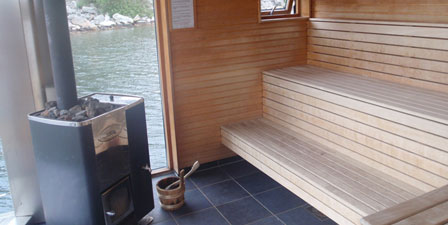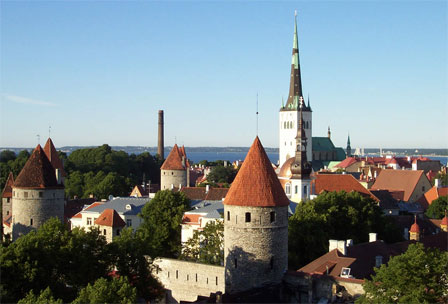Investor attention now is focused on the “Pigs” – the member-nations on the periphery of the Eurozone whose debt bubbles threaten to explode and fragment the currency union.
In lost jobs, destroyed businesses and higher taxes, the peoples of those temperate lands on the coasts of the Med and the Atlantic are starting to pay the price for decades of self-indulgence, and face years of stiff repayments still to come.
But Europe has another periphery, up north, where a harsher climate seems to have bred resilience and adaptability. Countries stretching from the border of Russia to the Arctic approaches – let’s call it the Sauna Club – have already matched up to their crises.
Their recent experiences offer interesting lessons, even role models, for the garlic-and-Guinness belt.
- Sweden is a role model for how governments should manage a financial crisis and reform an over-generous state. Its finance minister is now the most respected in the whole of Europe.
- Estonia is also a role model — for how a debt-bloated nation can take the pain, suffer the austerity, and kick-start economic recovery.
- Iceland is a fascinating example of how a tiny country that got in a terrible mess, with no outside support on offer, can ride out a crisis without buckling under to bullying from powerful, angry creditors.
- Finland shows how an economy hit hard by global recession can fight back and re-shape itself… as it has done before.
- Denmark is an example of how a small nation can gain the confidence of global investors to such an extent that it can borrow from them at way below the cost to major nations such as the US and Germany.
- Norway is a different kind of model – how to harness an abundance of energy resources to provide long-term for a continuing prosperous future.
These six nations, plus the Danish territory of Greenland, encompass 27 million people living in some of the world’s most progressive societies, with a combined economic output of $1.7 trillion a year, average incomes two-fifths higher than Germany’s, and considerable natural and human resources.
If they were united in a single economic union – as all except Estonia once were, in the 16th century – they would be one of the world’s dozen biggest economies. And perhaps they could be. The Swedish historian Gunnar Wetterberg has been advocating their reunification in a pan-Nordic federation under a single monarch, Denmark’s Queen Margrethe.
But for the moment the Sauna Club consists of independent entities that work well together, sharing much linguistically, culturally and socially, and offering some interesting lessons for other nations.
Four of them – Denmark, Finland, Norway and Sweden – have for many years been listed as among the world’s best in respect of economic freedom. Despite high tax rates, they are far ahead on other measures such as absence of trade barriers, ease in starting up a new business, and rule of law.
Once the global models for welfare states, they are now models for how to curb entitlement mentality fostered by over-generous welfare, embracing market-based reforms from profitmaking free schools to tough welfare-to-work rules.
The Sauna Club has lessons for the southern periphery, not only for dealing with the immediate problems of excessive debt, but also with the long-term distortions brought about by welfare, jobs, over-generous pensions, subsidies and other benefits provided by the state.
Sweden was an early leader in welfare reforms, slashing housing subsidies, introducing a private option for health insurance and a voucher system to provide parental choice in education.
When it suffered its own banking crisis in the Nineties, which saw interest rates soar at one point to 500 per cent, its government did not flinch from tough action.
It announced a state guarantee for all depositors and investors in banks (except for shares and subordinated debt) to restore confidence; nationalized the two worst, leaving their shareholders penniless, ring-fencing their dodgy assets in “bad banks” that then pursued debtors ruthlessly; and injected government cash into the sounder banks that found it difficult to raise private capital.
Eventually restored to profitability, the nationalized banks were sold back into private ownership. The bail-out ended costing less than 2 per cent of one year’s economic output. More importantly, the foundation was laid for economic recovery.
Members of the Sauna Club
Sweden Denmark Finland Norway Estonia Iceland
Economy’s size 575 344 264 486 23 14
GDP $ bn forecast for 2012
Income per person 60,000 61,000 49,000 97,000 17,000 41,000
$ forecast for 2012
Population 9.6 5.6 5.4 5.0 1.3 0.3
Millions
Public debt 41% 47% 45% 48% 8% 124%
Relative to GDP, 2010
Bond rating 94 109 81 67 n/a 24
Ten-year sovereign bond
index (Germany = 100)
Before and after the global debt crisis erupted in 2007, Sweden pursued policies oriented towards financial responsibility and promoting economic growth – scrapping some taxes, cutting others, thus creating 100,000 jobs; privatizing state-owned companies; giving employers the flexibility to lay off workers in bad times; trimming welfare costs to keep them in balance with available income; introducing choice and competition in healthcare and education.
Finance minister Anders Borg says the main lessons for dealing successfully with the fiscal crisis produced by recession are: cut quickly (don’t delay the pain, as the UK and others are doing), dare to slash the biggest expenses such as social benefits and pensions, ensure that the rich bear more of the burden, reform welfare to make work pay… and brace yourself for a political backlash.
That’s why Sweden has emerged so well from the global crisis. By European standards, its economy is a picture of health — still growing at the same rate as Germany’s, unemployment well below the European average, a balanced budget and a big foreign trade surplus.
At a time when there is increasing shareholder anger in other countries over the bloated pay given to corporate executives, it’s notable that in Sweden they’re paid much less (on average about 20 per cent below their British counterparts, for example), although they’ve delivered much higher returns, and there is no sign that relatively low pay drives them abroad to seek better jobs elsewhere.
read the next article – Tackling the crisis head-on
CopyRight – OnTarget 2012 by Martin Spring







